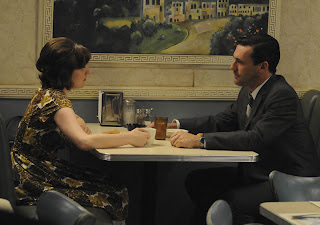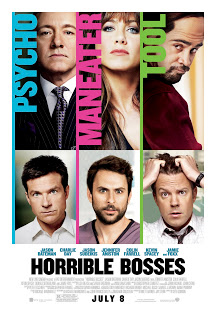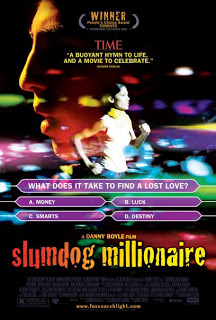Some of Betty Draper’s nuanced parenting skills.
Author: Amber Leab
True Camaraderie: Don, Peggy, and Something to Prove
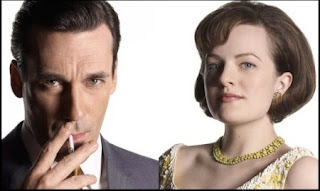 |
| Don Draper and Peggy Olson |
Mad Men YouTube Break: Peggy Olson Knows What She Wants
This clip was uploaded to YouTube by AMC, and they provided this description:
Peggy proves she can be one of the guys.
Despite the awful description (“one of the guys?” Is this really what she’s proving here??), it’s from a great scene.
Mad Men Week: Is Mad Men the Most Feminist Show on TV?
Written by Megan Kearns, cross-posted from The Opinioness of the World.
Historians are notorious for savaging historical fiction. We’re quick to complain that writers project modern values onto their characters, get the surroundings wrong, cover up the seamy side of an era or exaggerate its evils — and usually, we’re right. But AMC’s hit show “Mad Men”…is a stunning exception. Every historian I know loves the show; it is, quite simply, one of the most historically accurate television series ever produced. And despite the rampant chauvinism of virtually all its male characters (and some of its female ones), it is also one of the most sympathetic to women…But in 1965, feminism wasn’t a cultural option for most women. It would be another year before the National Organization for Women, the group that gave so many women the legal tools to fight discrimination, would be founded. Newspapers still ran separate want ads with separate pay scales for female jobs, seeking “poised, attractive” secretaries and “peppy gal Fridays.”
“But I have to say, most of the things negroes can’t do, I can’t do either. And nobody seems to care…Half of the meetings take place over golf, tennis, and a bunch of clubs where I’m not allowed to be a member or even enter.”
“What do you do around here besides walking around like you’re trying to get raped?”
there wasn’t even a word for the sexual harassment the character Joan experiences.
Joan’s decision to not go through with her abortion this season stirred up controversy. In an article at RH Reality Check, Sarah Seltzer argues,
“Mad Men” is known for being excruciatingly period-specific. Joan was not at a modern-day abortion clinic and she was not privy to a modern-day abortion debate. She had followed a specific plan which involved breaking the law and risking arrest–which speaks to a strong determination to begin with. There were no protesters and no one to tell her what she did was immoral. Sure, by the standards of her time she was a “loose woman” but there was no pro-life movement calling women selfish babykillers…It’s realistic for her character, the time period, and the plot for Joan to have had the abortion. The show’s writers and the many viewers who think “she didn’t go through with it” are imagining a modern-day conception of abortion fueled by iffy anti-choice tropes found in movies like “Juno” or shows like “The Secret Life of the American Teenager.
The real reason so many fictional characters choose to keep their babies may be much simpler than any of these theories: Babies advance plotlines, whereas abortions end them. As Ted Miller, a spokesperson for NARAL Pro-Choice America, said, “The history of abortion storylines has been mixed. The very personal circumstances are often lost in the pursuit of dramatic or sensationalized storylines.” An abortion can carry a single episode, or a few scenes in a film, while a baby provides fodder for seasons’ worth of material…Sure, Weiner could have found other ways to teach us more about the characters he’s created. But Joan’s decision on Mad Men—and Miranda’s on Sex and the City, and Juno’s in Juno, and so on—show that on screen, advancing the plot is more important than making a political statement.
Obviously Joan is not anti-abortion as she’s had two previous procedures. Barkhorn points out that some say screenwriters don’t want to show abortions as “they don’t want their heroines to appear unsympathetic.” While 1 in 3 women in the U.S. will have an abortion in her lifetime, it’s so rare for a film or TV show to depict that choice. Only a handful of shows have portrayed a character having an abortion including Maude, Private Practice and Friday Night Lights. Barkhorn also points to characters on Sex and the City (Samantha and Carrie) both of whom had abortions in their characters’ past. But when Miranda becomes pregnant and resigned to have an abortion, she backs out at the last moment. While some characters have gone through with abortions, it makes it seem that it’s a decision that young people choose, not successful adult women.
“You do your job so well. They respect you and you don’t have to play any games. I didn’t know that was possible.”
Peggy: “You know I just saved this company. I signed the first new business since Lucky Strike left. But it’s not as important as getting married…again.”
Joan: “Well I was just made Director of Agency Operations, a title, no money of course. And if they poured champagne it must have been while I was pushing a mail cart.”
Peggy: “A pretty face comes along and everything goes out the window.”
Joan: “Well I learned a long time ago to not get all my satisfaction from this job.”
Peggy: “That’s bullshit.”
Then they giggle knowingly.
We should be glad that the writers are resisting the temptation to transform their female characters into contemporary heroines. They’re not, and they cannot be. That is the brilliance of the show’s script. “Mad Men’s” writers are not sexist. The time period was.
Things They Haven’t Seen: Women and Class in Mad Men
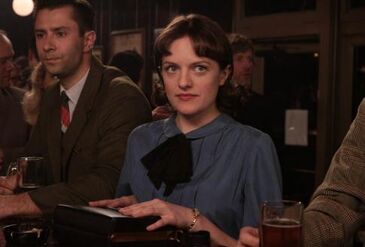 |
| Peggy Olson |
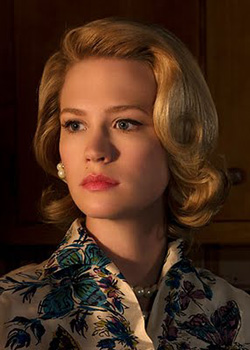 |
| Betty Draper Francis |
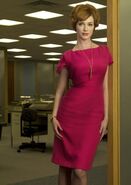 |
| Joan Holloway Harris |
Mad Men YouTube Break: The Mad Men School of Seduction
Sexual harassment or seduction? Sometimes it’s a fine line in Mad Men.
In my opinion, the best line award goes to Peggy:
I’m in the persuasion business, and frankly I’m disappointed by your presentation.
Or maybe it goes to Roger, for sheer…weirdness:
I want to suck your blood like Dracula.
What are some of your favorite “lines” from the show?
Mad Men Week: It’s Coming
Quote of the Day: Molly Haskell on "The Woman’s Film"
What more damning comment on the relations between men and women in America than the very notion of something called the ‘woman’s film’? And what more telling sign of critical and sexual priorities than the low caste it has among the highbrows. Held at arm’s length, it is, indeed, the untouchable of film genres […]Among the Anglo-American critical brotherhood (and a few of their sisters as well), the term ‘woman’s film’ is used disparagingly to conjure up the image of the pinched-virgin or little-old-lady writer, spilling out her secret longings in wish fulfillment or glorious martyrdom, and transmitting these fantasies to the frustrated housewife. The final image is one of wet, wasted afternoons. And if strong men have also cried their share of tears over the weepies, that is all the more reason (goes the argument) we should be suspicious, be on our guard against the flood of ‘unearned’ feelings released by these assaults, unerringly accurate, on our emotional soft spots.
As a term of critical opprobrium, ‘woman’s film’ carries the implication that women, and therefore women’s emotional problems, are of minor significance. A film that focuses on male relationships is not pejoratively dubbed a ‘man’s film’ (indeed, this term, when it is used, confers–like ‘a man’s man’–an image of brute strength), but a ‘psychological drama.’
Video Break: Christiane Amanpour Interviews Gloria Steinem
Guest Writer Wednesday: Horrible Bosses and the So-Called ‘Mancession’: A Review in Conversation
 |
| Horrible Bosses (2011) |
This is a guest post by Byron Bailey and Kirk Boyle.
Isn’t this movie the double-inversion of 9 to 5 (1980)? A progressive flick about exploited women enacting their (pot-induced) revenge fantasies against their bosses becomes, in these times, a reactionary tale about privileged men enacting their (resentment-fueled) revenge fantasies against their bosses. Where Parton and company hate their bosses for exploiting them, Batemen and bunch hate their bosses because they want to be (or fuck) them but can’t.
Am I being too harsh?
Byron’s Take:
The most execrable aspects of this star-studded mediocrity radiate from the characterization of Dr. Julia Harris (Jennifer Aniston) as the dirty-talking, sexually harassing dentist-boss. Now have there ever been instances of female-on-male sexual harassment in the workplace? No doubt, but the truth is that women endure unwanted sexual attention from men at an astronomically higher rate. This is yet another example of portraying the danger–as is often the case, beneath a veneer of mirth–of uncontrolled female sexuality (a very old formula indeed), here inflated into physical coercion. It has the effect of seeming to level the playing field: “See, women do it, too!” I’m not saying the makers of Horrible Bosses set out to accomplish this ideological task. They just wanted laughs, but the cumulative effect of such filmic representations has a way of getting into the cultural consciousness. Fatal Attraction (1987) unleashed its depiction of a crazed female stalker into a culture rife with male stalkers of women. Horrible Bosses presents an attractive, oversexed woman essentially stalking her hapless male employee, a scene right out of hetero male fantasy. Both films present female sexual desire as out of control.
Surely the worst moment in Horrible Bosses occurs just after Dr. Harris shows her assistant a series of photos depicting her taking advantage of him while he was under dental anesthesia. It is not clear, but some of the posed pictures may actually involve sex. The assistant (Day) says, “That’s rape!” He may well be right. She replies, “Just hold on there, Jodie Foster.” This can only refer to the 1988 film The Accused, an account of a real-life gang-rape victim whose character was essentially put on trial. (After all, she must have been “asking for it,” right?) Googling the film to get my details correct, I was met with “Jodie Foster Hot Rape Scene Video,” first result. I am not kidding. Try it. (Think we still have a problem?) So, what can Aniston’s line mean? “Don’t be so fast to accuse me like Jodie Foster did in that movie?” Or what? Because Horrible Bosses‘ point of view is that female-on-male sexual harassment is not really so bad (and most men would enjoy it if the woman were “hot”), how can this comparison of what the film sees as merely humorous, or at most embarrassing, with a filmic account of a real-life gang-rape do anything but belittle the seriousness of harassment and rape? Look, I’m not holding up The Accused as some sort of holy object, beyond humor. Laughing can help us deal with horrific things. Given the context, though, I really couldn’t believe my ears. I certainly don’t expect a mainstream comedy to conform to my ideological beliefs, but Horrible Bosses goes beyond the typical misogynistic gross-out humor so popular in recent years and graduates to the realm of the truly offensive.
As you rightly note, these three downtrodden amigos hold not just jobs but careers, and they enjoy disposable income. For example, while brewing up the idea to kill their bosses, Sudeikis mentions paying someone to clean his apartment and cut his hair. This line of thinking informs their plot to kill their bosses by hiring a hitman. Although they gripe about their jobs, any dirty work (housekeeping or murder!) is beneath them and within their means to outsource (to black men who are stupid (Jamie Foxx), but wait, might be smarter than they seem to be. Essentially, what we have is two privileged white men (Batemen and Sudeikis) whose exasperation derives from being unable to take the next step up the corporate ladder because the economy has turned sour right when they were in line for a promotion, but since the dominant ideology peddled by Hollywood cannot represent the true culprit of their thwarted desires, it displaces responsibility onto the figure of the “horrible boss.” It’s not the perverted (rotten-to-the-core) capitalist system that is to blame for your unfair treatment, it’s the perverted (bad apple) capitalist.
The logic of the third guy’s (Day) “occupational” ressentiment, as you allude to, seems different than his buddies’. Day’s character is not “trapped” because he can’t get as sweet of a position as the one he already holds within this busted economy. No, he’s trapped because he is getting married and wives-to-be are expensive commodities (and untrustworthy, cheating whores, e.g. Spacey’s character’s wife). Perhaps, however, this plot line simply serves to amplify the ever-so-slightly-less-explicit misogyny of the other two.
Perhaps too, we have reached a point in the post-ironic, late capitalist, culture industry where we need as many words for “sexism” as the Inuit have for snow. Horrible Bosses does its very best to showcase them all. Explicit misogyny: Jennifer Aniston’s character is introduced with white-lettered words that fill the screen: “Evil, Crazy Bitch.” Patronizing sexual harassment: Sudeikis’s character’s treatment of the “FedEx girl” who delivers to his company. Objectification: Sudeikis leaves a sports bar stool so he can “see that girl about her vagina.” Homophobia-as-misogyny: Aniston calls Day a “little pussy” and “little faggot” when he won’t sleep with her. Reverse-sexism-is-traditional-sexism: Aniston’s character is meant to imply that men can be sexually assaulted at work like women, but all it really reinforces is that men have a right to hate women for not fulfilling their fantasy images of them. Meta-misogyny: the outtakes include Sudeikis looking directly at the camera to remind the frat row yahoos of the film’s takeaway absurdist joke: “bend her over and show her the fifty states.” That’s not even to mention the relentless rape-is-hilarious misogyny.
Byron’s Take:
The use of “little faggot” and “little pussy” as companion terms of abuse (as you observe) unites misogyny and homophobia in one neat “little” package (pun intended). On broadcast television where the explicitness of those words calls for a cleaner alternative, the admonition “Man up!” encompasses both notions. (Why are we getting so many examples of women ordering men to be more masculine lately?) Horrible Bosses goes out of its way to police male affect, from the insufficiently masculine dental assistant (Day) to the automatically-masculine-by-virtue-of-blackness ex-con (Jamie Foxx) and his fellow bar patrons. There is, however, a moment of slippage. It occurs in the scene that follows the trio’s consultation with “Motherfucker Jones” (Foxx), their presumed hit-man. The two more successful–and in the film’s gaze, seemingly more attractive–guys (Bateman, Sudeikis) begin to argue about which of them would be raped the most if they went to prison. This works within a constellation of rape references in the film as yet another way in which white guys (with good jobs) can (potentially) get fucked (or fucked over) by someone or something. Allow me to overlay another reading. Psychological surveys suggest rather strongly that the most virulently homophobic males tend to be haunted by same-sex desire; hence, they project their loathing outward. They unconsciously know something about themselves, something that gnaws at them. This scene could be the film (or its screenwriters) expressing its/their unconscious gay desire. Additionally, the scene explores a blurring of subject positions; that is, it depicts desire and gender performance as a continuum rather than an either/or. While the film berates “faggots,” it nonetheless depicts hetero males displaying an affect that the culture defines as “feminine” (“Will they find me attractive?”). There’s a moment of complexity here, as if the film (like a human mind) knows more about itself than it thinks it knows. Still, this knowingness is itself part of a regressive network of references whose overall messages you’ve summed up perfectly, to which I would add the cultural acceptance of men being raped in prison as an eventuality that can’t–or needn’t–be avoided. (After all, they’re mostly black, right? Don’t even get me started on our rapacious prison-industrial-complex and how the “justice” system so ably feeds it).
There will probably be those who say we’re making an awfully big deal about a throw-away comedy, something that’s “just entertainment.” Unfortunately, contemptible crap like Horrible Bosses teaches the culture to affirm its worst negative stereotypes beneath a veneer of farce. (If only it were smart enough to satirize them at the same time.) Leaving these complaints aside, in the plainest terms of bang-for-the-bucks multiplex entertainment, this film is still a dismal failure. The considerable talents of Spacey, Farrell, Bateman, and Foxx are wasted, and Aniston, who can be very effective in the right role, hits an all-time low. (I guess we’re supposed to find it progressive that Aniston, at the advanced (Hollywood) age of 42, can still be displayed as a sex object. Granted, but she’s playing young, not “cougar,” which is another issue altogether.) Bateman’s character alone is marginally sympathetic, and mostly because one associates him with better material. Arrested Development is a comedic project that pushed the limits of taste, dealt with a character going to prison, presented a female character who satirized sluttiness, explored sexual orientation for laughs, had characters contemplating violence, and mixed a great many other over-the-top situations together for the sake of humor. That show illustrates how topics like these can be the occasion for genuine belly laughs, and at the same time be thoughtful and smart and not at all mean-spirited. Nearly everybody I know who watched Arrested Development–people of diverse ideological outlooks–found the show hilarious, and it was anything but safe or tame. Neither of us is asking for politically-correct comedy (which would suck), just comedy that makes us laugh without adding overtly to the negative aspects of our culture. Lately, this seems too much to expect.
Emmy Week at Bitch Flicks – Call for Writers
 |
| The 63rd Primetime Emmy Awards: Sunday, September 18 at 8pm |
We’re looking for reviews and/or analysis of Emmy-nominated Television shows as well as character analysis of the Emmy-nominated Lead Actresses and Supporting Actresses. We’re leaving the topics wide open; the only criteria is that the analysis focuses on how the show portrays women in some way. Feel free to browse our Television category on the sidebar for examples and ideas. But we’re open to ALL proposals, so don’t limit yourselves. Finished pieces must be completed (and e-mailed to us) no later than Friday, September 2nd. We are open to original pieces and cross posts (with permission). Here are the possibilities:
Reviews and/or analysis of:
- Outstanding Comedy Series nominees
Glee- Parks & Recreation
- The Office
- Modern Family
- 30 Rock
- The Big Bang Theory
- Outstanding Drama Series nominees
- Boardwalk Empire
The Good WifeMad MenFriday Night Lights- Dexter
Game of Thrones
Character analysis pieces for:
- Outstanding Lead Actress in a Comedy Series nominees
- Cathy Jamison (Laura Linney) in The Big C
- Jackie Peyton (Edie Falco) in Nurse Jackie
Leslie Knope (Amy Poehler) in Parks & Recreation- Molly Flynn (Melissa McCarthy) in Mike & Molly
- Virginia Chance (Martha Plimpton) in Raising Hope
Liz Lemon (Tina Fey) in 30 Rock
- Outstanding Lead Actress in a Drama Series nominees
- Peggy Olson (Elizabeth Moss) in Mad Men
Tami Taylor (Connie Britton) in Friday Night LightsDetective Olivia Benson (Mariska Hargitay) in Law & Order: Special Victims UnitSarah Linden (Mireille Enos) in The Killing- Alicia Florrick (Julianna Margulies) in The Good Wife
- Harriet Harry “Korn” (Kathy Bates) in Harry’s Law
- Outstanding Supporting Actress in a Comedy Series nominees
- Sue Sylvester (Jane Lynch) in Glee
- Elka Ostrosky (Betty White) in Hot in Cleveland
- Claire Dunphy (Julie Bowen) in Modern Family
- Various Characters (Kristen Wiig) in Saturday Night Live
Jenna Maroney (Jane Krakowski) in 30 Rock- Gloria Delgado-Pritchett (Sofia Vergara) in Modern Family
- Outstanding Supporting Actress in a Drama Series nominees
- Margaret Schroeder (Kelly Macdonald) in Boardwalk Empire
- Joan Harris (Christina Hendricks) in Mad Men
- Mitch Larsen (Michelle Forbes) in The Killing
- Kalinda Sharma (Archie Panjabi) in The Good Wife
Mags Bennett (Margo Martindale) in Justified- Diane Lockhart (Christine Baranski) in The Good Wife
- All pieces must be complete and emailed by Friday, September 2nd.
- If you intend to submit, please email a brief description of your piece as soon as possible.
- Contact us at btchflcks(at)gmail(dot)com.
Best Picture Nominee Review Series: Slumdog Millionaire
 |
| Best Picture nominee Slumdog Millionaire |
This is a guest post from Tatiana Christian.

